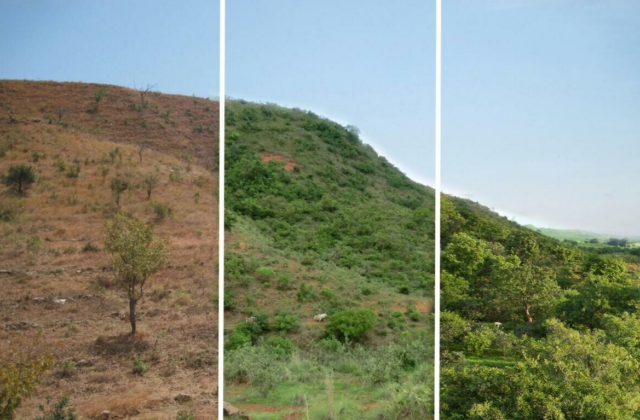
Sometimes innovation is amazingly simple
By World Vision
Rediscovering indigenous practice to green the Sahel
One example is the Farmer Managed Natural Regeneration method, or FMNR for short. This is an indigenous practice that has been used for centuries in the Sahel, but was “rediscovered” by alternative Nobel Laureate (Rights livehood Award, 2018) Tony Rinaudo.

In the early 1980s, Australian Tony Rinaudo works in Niger. He planted trees in his programs, aiming to green the Sahel — the result: years of disappointment and disappointing results. Young Tony is about to throw in the towel and fly back to Australia, until one day he drives his pickup truck across the vast desert plain on a dirt road. To drive better over the loose sand, he gets out of his car to lower the pressure in his tires. All around him, he sees a dry landscape with no trees. He is distraught. Tony, a Christian man, prays in his despair.
He wants to get into his truck when his eye catches a small bush down the road. He walks up to it and sees that it is not a bush. From the shape of its leaves, he recognizes this bush as a tree: a kalgo (a species of tree native to the Sahel).
He realizes that this small bush was created from the cut trunk of a tree, which is the beginning of a success story. Whereas newly planted trees still have small fragile roots, the shrubs have a huge root system underground. Rinaudo calls it “the underground forest”.
Environmental and social gains
By cultivating this, regrown trees are not the only gain. Harvests appear to increase as a result, previously depleted water sources return, biodiversity increases, and CO2 is removed from the air. This effectively creates oases in the desert.
Imagine a green, water-rich, animal-rich area in an otherwise completely withered environment. That, at a glance, is what FMNR brings about. Over 6 million acres of arid land have been greened today, representing over 240 million trees. Food security has increased for over 5 million people.
It is profit upon profit upon profit. As harvests increase, it creates a source of food for families to feed their children and a source of income that allows children to attend school. FMNR is a vital part of restoring communities to self-sufficiency.
World Vision also seeks collaboration with other parties for this method, such as United Nations, United Nations, Europese Commissie, Wageningen University, JustDiggit, BothEnds, Tropenbos, CARE and many others.